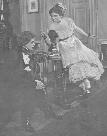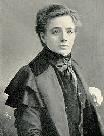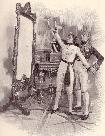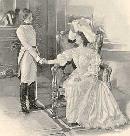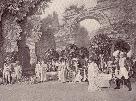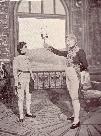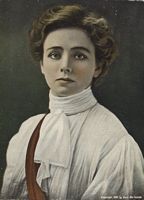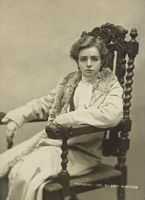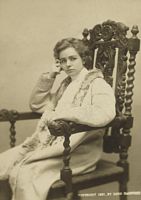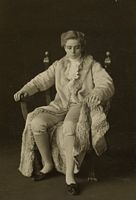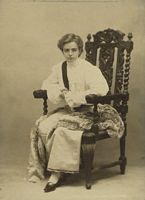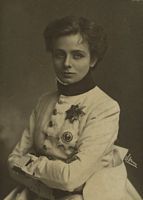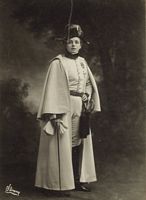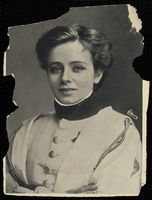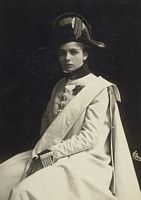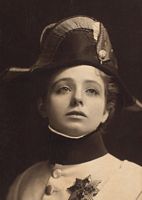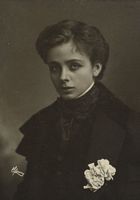
L'Aiglon
The six-act play opened at the Knickerbocker Theatre on October 22, 1900 and ran for a total of 73 performances. The play was produced by Charles Frohman, and was adapted into English by Louis N. Parker from the work by Edmond Rostand.
“L'Aiglon required of its leading player interpretive powers which far exceeded Maude's range of abilities." (Maude Adams, an American Idol: True Womanhood Triumphant in the Late-Nineteenth and Early-Twentieth Century Theatre, doctoral thesis, 1984, Eileen Karen Kuehnl)
“The seeming perversity of casting Maude in a role created for a dramatic genius actually amounted to shred financial speculation. ...he (Frohman) knew that he first had to entrust the title role to a star-status performer who automatically drew crowds-a power Maude had undeniably demonstrated as Juliet. ...He also correctly guessed that public wonderment about Maude's worthiness to fill Bernhardt's shoes would result in brisk ticket sales." (Maude Adams, an American Idol: True Womanhood Triumphant in the Late-Nineteenth and Early-Twentieth Century Theatre, doctoral thesis, 1984, Eileen Karen Kuehnl)
=====from the Acton Davies book=====
"To say that she has grasped the possibilities of this part even now, when she has been playing it for several months, would be absurd ; her physical powers could not reach them, although her readings show clearly that she has fully grasped the meaning of the part. When, six weeks after Miss Adams' appearance at the Knickerbocker, Sarah Bernhardt appeared in L'Aiglon at the Garden, it was inevitable that comparisons would be made. They were-but it is unnecessary to enter into that subject here. Miss Adams is still playing L'Aiglon to crowded houses. Madame Bernhardt has had a disastrous season through the West."
"At the Academy of Music in Baltimore Maude Adams made her first appearance in L'Aigion. She scored an honest and legitimate success; a success, however, which, in the very nature of things, was subordinate to the success of the play itself. For somehow the reports from Paris, enthusiastic as they had been with regard to Bernhardt's performance of the play, seem scarcely to have done Edmond Rostand's work justice. Even Parisians themselves admitted that as played in Paris it was too drawn out, too talky-talky, as it were. In the adaptation which Louis Parker, supplemented by Edward Rose, had made, the pathos of the play has been preserved., while its action has been strengthened so successfully that the interest never lags. With all its superfluities of verbiage cut away, this play in its English version stands out clean-cut, tremendous., like a star. It is no exaggeration to say that one has to look back to Hamlet to find its peer in the matter of histrionic possibilities. There are scenes which are so great in themselves that while only one, or perhaps two, actresses in the world could realize their possibilities, still from the very strength of the scenes no actress of fair ability could fail in them."
"This mark you, is no slur upon Miss Adams' work, for she accomplished marvels. The great scenes, to be sure, lay far, far beyond her, but she brought out the pathos of the life of this poor little eaglet of Napoleon's with so much delicacy and tenderness and, in some instances, power, that she carried her audience completely away with her. In the early scenes she so completely fascinated the audience by her own personality that when the great scenes came she had her hearers completely in her power. The strength of the situation swept her along, and it wasn't until the next morning, over their ham and eggs, in perfectly cold blood, that they began to realize how much greater the play was than the actress. At the same time it must be conceded that in this play Miss Adams scored the great success of her career. With all her shortcomings, her work in L'Aiglon was immeasurably superior to her work in either Barrie's Little Minister or as Shakespeare's Juliet."
"But at the same time neither all the king's horses nor all the king's men can ever make this clever little actress encompass the full possibilities of this great role."
"She was at her best in the opening act. Here, Bernhardt herself did not surpass her. In the scene where the old tutor attempts to give her a history lesson not at all in accordance with the facts, but entirely in accordance with the orders of her Austrian guardian, Miss Adams was superb. She played this scene with a combination of raillery, wit, and satire which carried all before her. The black garment she wore in this act made her look ghastly - exactly the poor, frail little consumptive she was intended to be. In some of her later scenes she overworked her cough so much that it reminded one of a second-rate Camille. But in her performance of that first act there was no flaw. Her first great test, however, came in the second act, where Prince Metternich drags the young Duke before the mirror and bids him look upon the puny, sickly, effeminate face of his father's son. L'Aiglon snatches the lamp from the Prince's hand and smashes the mirror into fragments. Miss Adams played this scene most cleverly, but the strength of the stage business made it seem almost great."
"In the third act Rostand, the playwright, could not help her much. The fancy dress ball at Sch6nbrunn is at its height, and under the park trees the hapless lad learns for the first time the depths of his mother's infamy. There was no well-managed climax to assist Miss Adams here. She had to rely entirely upon her facial by-play and her elocution. Both were unequal to this great task. It was in this scene that Miss Adams' performance reached its lowest ebb. To be sure, the next act, on the battlefield of Wagram, where the voices of the thousands that Napoleon had slain arose to haunt him, L'Aiglon lay immeasurably beyond the little artist's reach, but at the same time the scene was so terrific in itself that it brought Miss Adams enthusiastic curtain calls. In the closing act, the death scene, her acting was entirely conventional, and she lost a great deal of the grip which she had upon her audience throughout the earlier part of the play."
"In short, to sum her performance up, Miss Adams accomplished a great many more wonders than any rational person dreamed she was capable of. But at the same time she did not realize the possibilities of L'Aiglon. And after that first performance, when she finally got to bed, tired out after a great night's work finely done, Miss Adams must have easily found it in her heart to say, "God bless M. Rostand, Mr. Frohman, and all my stage managers." For Mr. Charles Frohman had laid himself out upon the production, and all the intricacies of Rostand lines and stage business had been so admirably handled by Stage Manager Humphries that Miss Adams' task had been made easier for her a hundredfold."
"It was in his amours that Miss Adams' L'Aiglon was at its weakest. The young Duke's passion for Fannie Elssler had all the ardour of water mixed with milk. . After she shed the funeral garb of the first act Miss Adams looked uncommonly well. The white uniform became her., and her costumes were so neatly cut that they made her at times look almost sturdy."
"Mr. Parker's adaptation had been admirably done, but there was one great flaw in it. Indeed, this change deprived the play in one sense of a great deal of its natural strength : L'Aiglon from first to last was made an entirely sympathetic role. This is all wrong".
"In the French play, one of the strongest hits is scored when Rostand demonstrates that his poor little Eaglet, beating hopelessly against the bars of his physical cage, is not only an inflamed enthusiast., but, when put to the crucial test, is also an arrant coward. This little wing-clipped eaglet, this bird in a gilded cage which Miss Adams presents, is always pathetic, always thoroughly lovable, but one has to strain both his ear and his imagination to hear him passionately railing against both his fate and his cage."
"Miss Adams had attempted a daring feat and carried it through, if not with the greatest honours, at least successfully. She had fairly earned every ounce of the applause."
"The play treats of L'Aiglon (The Eaglet), Napoleon's son. He dreams of regaining his father's empire. But the idea remains a dream for although he is the true heir of the Corsican, yearning for conquest, he is physically weak and consumptive. After an abortive attempt to follow in his father's footsteps he is beaten at the Battle of Wagram, and eventually dies, the expiation of glory bought with human lives." (The Theatre Handbook and Digest of Plays edited by Bernard Sobel, 1940)
=====Charles Frohman:" Manager and Man by Issac F. Marcosson and Daniel Frohman, with an Appreciation by James M. Barrie. 1916=====
It was in 1900 that Miss Adams first played the part of a boy, a type of character that, before many years would past, was to give her a great success. Her debut as a lad, however, was under the most brilliantly artistic circumstances, because it was in Edmond Rostand's "L'Aiglon," adapted in English by Louis n. Parker. As the young eaglet, son of the great Napoleon, she had fresh opportunity to display her versatility. It was a character in which romance, pathos, and tragedy were curiously entwined. Bernhardt had done it successfully in Paris, but Miss Adams brought to it the fidelity and brilliance of youth. In "L'Aiglon" she was supported by Edwin Arden, Oswald Yorke, Eugene Jepson, J.H. Gilmour, and R. Peyton Carter.
When Charles Frohman put Miss Adams into "Romeo and Juliet" she received a whimsical letter from J.M. Barrie, saying, among other things;
"Are you going to take Willie Shakespeare by the arm and l'ave me?"
=====Hear the Distant Applause! Six Great Ladies of the American Theatre by Marguerite Vance, 1963=====
Now she was to meet him. First, however, she was to go to Paris to see the great Sarah Bernhardt in Rostand's play about Napoleon's son, The King of Rome, L'Aiglon. Maude was to play in the English translation of the play the following autumn. No sooner had she reached Paris and read the newspaper accounts of Madame Bernhardt's performances than sheer terror overcame her. She knew that if she saw the great Bernhardt play L'Aiglon she never would have the courage to play it herself.
A little desperate, she left for London. And what a welcome awaited her at the Barries'! Forever after, she knew that James M. Barrie would hold the inspiration for her finest work, just as she knew that Charles Frohman would always be its motivating force. When she left London to take the boat train she felt she had known the Barries all her life.
Until now Maude Adams had not permitted herself the luxury of nerves when opening in a new play. Nervous she was occasionally, but it was only the nervousness natural to any exciting occasion in which one played a major part. She had little patience with mediocrity, and she gave her best at all times and approached opening nights with a modicum of uneasiness. But with the opening of L'Aiglon Maude Adams faced a peculiarly trying situation. Sarah Bernhardt was opening in New York in the French version of the play at the very time she was opening in the English translation. She, Maude Adams, and the "Divine Sarah," acting in the same play at the same time in the same city!
On opening night, Maude heard her cue and walked out before the footlights in such as state of nervousness that her first lines were almost inaudible. Then something of the Scotch-Irish spirit of the Kiskaddens stirred in her; she lifted her head high, thrust out her delicate chin, and spoke with the imperious dignity of the King of Rome. With that quick upswing of confidence her performance took on warmth and color, and the final curtain fell to a standing ovation. The following morning, one of the critics wrote:
"Bernahrdt's L'Aiglon lacks the celestial fire that glows in Rostand's creation, and which an American actress, with not a tithe of the Frenchwoman's force and finesse, has been able to impart to her own representation of the character. I had resolved to refrain rigidly from impertinent comparison in this critique; but the amazement with which I saw how Maude Adams has grasped the heart and soul of the Duc de Reichstadt, and how the essence of the poet's conception has eluded Bernhardt vanquished my scruples. I asset that in the one quality that makes for true greatness in acting, the L'Aiglon of Maude Adams surpasses that of Sarah Bernhardt as the stars surpass the moon."
Another added: "Pride in an American actress makes it pleasant as well as just to say that her representation of the ill-fated young duke is better than Sarah Bernahardt's."
Yet in her joy at having achieved high honors, Maude Adams refused to listen to comparisons that were derogatory to Madame Bernhardt. "She is beyond criticism," she said.
=====French Theatre in New York: A List of Plays, 1899-1939 by Hamilton Mason; Columbia University Press, 1940=====
Cyrano de Bergerac stirred up enough excitement for both L'Aiglon and Chantecler to be events of prime importance during their respective seasons. L'Aiglon had the shorter run of the two, possibly because the Napoleonic legend could not arouse the same enthusiasm here as in France. The critics were, on the whole, in favor of Maude Adams, and she had no difficulty in meeting Bernhardt's competition. The New York Times even preferred her mirror and Wagram scenes to those of the Bernhardt production.
L'Aiglon: L'Aiglon, Edmond Rostand; adapter, Louis N. Parker; producer, Charles Frohman; Knickerbocker Theatre; October 22, 1900; 72 performances; with Maude Adams (Duke of Reichstadt), J. H. Gilmour (Flambeau), Edwin Arden (Prince Metternich), Percy Lyndall (Count Prokesch), Eugene Jepson (Baron Friedrich von Gentz), Oswald Yorke (Attach of the French Embassy), William Lewers (the Tailor), Edward Lester (Count Maurice Dietrichstein), R. Peyton Carter (Baron d'Obenaus), Joseph Francoeur (Emperor Francis), J. H. Benrimo (Marshal Marmont), William Crosby (Count Sedlinsky), Clayton Legge (Marquis of Bombelles), William Irving (Tiburtine de Loget), Rienza Cordova (Lord Cawley), Edward Jacobs (Count Sandor), H. D. James (Dr. Malfatti), Herbert Carr (General Hartman), John S. Robertson (Captain Foresti), Lloyd Carleton (an Austrian Sergeant), Frederick Spenser (a Country Doctor), Byron Ongley (His Son), B. B. Belcher (Thalberg), Morton H. Welson (Montenegro), Charles Martin (the Chamberlain), Henry P. Davis (Officer of the Guard), Charles Henderson (Marquis of Otrante), Don C. Merrifield (Goubeaux), Henry Clarke (Pionnet), Thomas H. Elwood (Morchain), George Klein (Guibert), Frank Goodman (Borofski), Ralph Yoerg (Police Officer), Walter Butterworth (Archduke), Ida Waterman (Marie Louise), Sarah Converse (Archduchess Sophia), Ellie Collmer (Theresa de Loget), Sara Perry (Countess Camerata), Margaret Gordon (Fanny Elssler), Frances Comstock (Scarampi), Edith Scott (Mina), Beatrice Morrison (Archduchess).
L'Aliglon: L'Aiglon, Rostand; producer, Charles Frohman; Harlem Opera House; February 4, 1901; 7 performances. Cast of No. 73 )[above] except John S. Robertson (Dietrichstein), Edward Randall (Count Sandor), John Little (Captain Foresti), Edward Rice (Thalberg), Clarke Stevenson (Officer of the Guard), Harvey Benton (Marquis of Otranto), Rose Flynn (Mina), Catherine Proctor (Lady), Annie Lockhart (Lady).
=====The Stage in America, 1897-1900 by Norman Hapgood; The Macmillan Company, 1901=====
L'Aigion is much higher in tone than Cyrano ; less brilliant, but simpler, more coherent, more elevated. It was given first in America, in the fall of 1900, in an English translation by Louis N. Parker, which was firm, easy, and sometimes beautiful. The greatness of the drama triumphantly showed itself against wholly erroneous playing by most of the principal actors. From Miss Maude Adams, in the title rle, down, they perversely or timidly threw away the opportunities given them by the brilliant stage-craft of the author, obscured his sentiment, and mumbled his words in their teeth. As for verse, it was at every instant of the play turned in the rendering to baldest prose. Never was the nature of an imaginative tragedy more completely ignored, and this time, at least, the result was so unmistakable that the effect may in the end be good, by forcing those responsible for this performance to imitate, in future attempts to handle the higher drama, some of the intelligence recently shown by several American stars. In general supervision there was -- not to speak of such experts as Mr. Mansfield and Mrs. Fiske -- nothing approaching the understanding shown in the management of Romeo and Juliet . As for the principal part, although Miss Adams wins so many hearts, mine among the rest, by her refinement and gentleness and her constant work while on the stage, no actor can safely take a great part and utterly pervert its meaning. Change the sullen sadness of the eaglet to the cooing of a slightly perturbed dove, and Rostand's play loses its soul. Take away the mighty dreams of Napoleon's enfeebled son; his violent imagination, beating with faltering wing against his cage; his bitter mocks and sudden gusts of passion -- and you take away the character which makes the play. This nature of the eaglet, the impeded flicker of his ominous father, has been expressed by Rostand's genius in words that bite one moment and soar the next, and in images that are large, dramatic, and oratorical, and these outbursts of eloquence or stabs of irony were dropped in the manner of one saying, "Give me a peanut, please." For mockery there was sweetness, for poetry there was prose, and for romantic patriotism and fitful dreams there was a little gentle pathos.
=====Aspects of Modern Drama by Frank Wadleigh Chandler; The Macmillan Company, 1914=====
Napoleon's son, the young duke of Reichstadt, is 'the Eaglet'--'l'Aiglon.' His dream of regaining his father's lost empire is a dream and nothing more, for the boy is shut off by circumstances from achieving greatness. Mentally, he is heir of the Corsican, yearning for conquest; physically, he is weak and consumptive, the heir of Austrian decadence. Thus, heredity dooms him to failure, and environment steps in to cap heredity, for the duke is held at the Austrian court virtually a prisoner.
Although he is not without friends who are scheming in secret for his return to France, the little duke is a passive and reflective character, born in times that are out of joint, and lacking the ability to set them right. His ambition, however, continues to grow, well into the third act. In his interview with his grandfather, the Austrian Emperor, it attains its best promise of success. Then Metternich intervenes, sets the emperor and his grandson by the ears, and later, in the mirror scene, forces the boy to study in the glass his own features and remark there clear tokens of his descent from the mad house of Austria.
For a little, the duke loses courage, and is ready to sink into the life of sensuous indulgence prepared for him by Metternich. But this mood drops from him when he finds his mother, the widow of the great Napoleon, listening to the cajoleries of a courtier. In rebuking the latter, he feels the Corsican again rise within him. A plot for his escape is on foot. He is about to elude his enemies when he learns that his cousin, disguised as himself, is in mortal danger. He hesitates, and on the field of Wagram is overtaken. There, in fancy, he has overheard the accusing voices of the slain clamoring around him, and has seen, in the gray of dawn, shattered arms outstretched toward him. At last, he understands that he is the expiation of his father's deeds, of glory bought with human lives. As the dawn brightens, he draws his sword as if to lead those spectral legions in a charge; but the roll of actual drums beats upon his ear, and an Austrian regiment marches in. Saluting, he accepts his destiny.
In the sixth act the 'Eaglet' dies at the close of a scene of over-calculated pathos, and Metternich, still inflexible, says merely, "Clothe him in his Austrian uniform."
The play is unduly theatric. It fairly teems with pre-established coincidences and antitheses. Hugo himself could have wished no more. Thus, Metternich has but remarked that there is no harm so long as the shouting for Napoleon is done in the theatres, when cries from without are heard"Long live Napoleon!" As one who is reciting speaks the line, "O, fallen child of godlike race!" 'the Eaglet' enters. Just as the Emperor and 'the Eaglet' have made terms and each is saluting the other, who should open the door but Metternich? And Metternich, by night, in 'the Eaglet's' ante-chamber, after apostrophizing Napoleon's hat on the table, affirms that he might fancy that by turning he would see upon the threshold a grenadier on guard; whereupon, so turning, he perceives Flambeau standing guard there in his grenadier's uniform. There are dozens of such carefully prepared theatrical strokes. Theatric, too, is the use of stage properties, and theatric are the principal scenes--that between Metternich and Flambeau when the latter seeks to convince the former that he dreams; that between Metternich and the duke before the cheval glass, closed by the duke's dashing the candelabrum into the mirror; and that of Flambeau's stabbing himself, the blood from his wound being at first mistaken for the ribbon of the Legion just torn from his breast.
Granted be it, then, that these mechanical surprises, contrasts, and coincidences are repugnant to the ways of naturalism, yet the fact remains that this play carries conviction so far as it sets forth the conflict of the individual with fate, a fate compounded of heredity and environment. What redeems the work from being mere melodrama is Rostand's poetical appeal to the imagination, an appeal that makes even his stage properties emotionally significant, and that gives life to his two chief characters. In manner "l'Aiglon" is romantic; in theme, it is naturalistic.
=====The Theatre Handbook: And Digest of Plays by George Freedley, Bernard Sobel; Crown Publishers, 1940=====
L'Aiglon. Edmond Rostand (French). Drama. 6 acts. 1900.
The play treats of L'Aiglon (The Eaglet), Napoleon's son. He dreams of regaining his father's empire. But the idea remains a dream for although he is the true heir of the Corsican, yearning for conquest, he is physically weak and consumptive. After an abortive attempt to follow in his father's footsteps he is beaten and captured at the Battle of Wagram, and eventually dies, the expiation of glory bought with human lives.
=====A Short History of the Drama by Martha Fletcher Bellinger; H. Holt and Company, 1927=====
In L'Aiglon the author has taken one of the many eminent but insignificant creatures of history, and out of his futile dreamings made a tragedy which echoes the tragedies of all the dreamers of the world.
=====American Theatre: A Chronicle of Comedy and Drama, 1869-1914 by Gerald Bordman; Oxford University Press, 1994=====
Yet another lovely star appeared in short order. With Fanny Davenport dead, one question was who would perform Sarah Bernhardt's roles on American stages. For the moment the answer seemed to be Maude Adams. The play was Edmond Rostand's L'Aiglon ( 10-22-00, Knickerbocker), which Charles Frohman offered in Louis Parker's translation. The story of the brief life and pathetic death of Napoleon's son was well known and, in this drama, had been a huge success in Paris. Critical response to the work was largely favorable, but interest in the star overwhelmed it. Dithmar's reaction was representative: "She looks the scion . . . to the life. One never thinks of her as a woman from the beginning of the play to its sad last scene. . . . Her portrayal is flawless. Not a gesture or a pose is out of place. . . . The young artist's integrity of purpose, her dramatic aptitude, and sympathy shine through all the performance." The production fattened Frohman's coffers for nine weeks and did even better on tour.
=====Curtain Time: The Story of the American Theater by Lloyd Morris; Random House, 1953=====
Nor in Edmond Rostand's L'Aiglon did she, in their opinion, rival Mme. Sarah Bernhardt.
=====Guide to Great Plays by Joseph T. Shipley; Public Affairs Press, 1956=====
Edmond Rostand
The battle of Wagram against the Austrians ( 1809) was the bloodiest of all Napoleon's battles, with a loss of some 25,000 men on each side. As part of the consequent treaty of Schoenbrun, Napoleon married Maria Louisa, daughter of Emperor Francis of Austria. The son of this union, the Duke of Reichstadt, was raised at the court of Francis, and kept without education by Metternich who, before a mirror, used to show the Duke that he had inherited, not the strength of Napoleon, but the indecision and impotence of the Hapsburgs. Followers of Napoleon, disguised as servants, sought to fledge the eaglet ( l' aiglon) in his father's memory. Edmond Rostand's play, L' Aiglon, pictures these scenes and the flight of the Duke toward France, his night on the Wagram battlefield -- where he ponders the cost of ambition in blood and tears, as Napoleon's dead forces arise in the princeling's vision -- his capture, and his pining death at the gay and trivial court.
When the play opened in Paris March 15, 1900, with Sarah Bernhardt in the title role, Anatole France, Victorien Sardou, Jules Lemaitre, and the elder Coquelin were in the audience. Also in the audience were Dreyfusards, Nationalists, Monarchists, and many that cherished the memory of "the little corporal", each group ready to shout its partisan feelings.
The Duke of Reichstadt was twenty years old, Sarah Bernhardt, fifty-six. It was an opening fraught with more than the usual terrors. The Englishman Maurice Baring reported: "I have never witnessed a more authentic triumph on the stage. I never saw before or since an audience which was prepared to be hostile so suddenly and completely vanquished. . . . It was one of the greatest feats that has ever been achieved in the history of the stage".
In America, Maude Adams opened as "the eaglet" in Baltimore on October 15, 1900, coming to New York in November just before Sarah Bernhardt and Coquelin (as Flambeau). Bernhardt played the role in New York again in 1906 and 1910. Other revivals include one in 1927, with Michael Strange (Mrs. John Barrymore); 1929, with Alexander Kirkland; 1934, Eva Le Gallienne as L' Aiglon, and Ethel Barrymore as the Duchess of Parma; and 1946 (Equity Library). Adaptations have been made by Louis N. Parker, Basil Davenport, and Clemence Dane; the last, used in 1934, considerably shortens the role of the old Napoleonic soldier Flambeau, omitting a poignant scene, Flambeau's attempt to teach the young Duke the art of war, with wooden soldiers.
There is a natural pathos in the story of the wistful, thoughtful young man who regretted at once the devastation his father had spread and the loss of his father's glory. Partly, perhaps, for its political implications, for the patriotic fervor it roused through its presentation of the many nations' pact against Napoleon, French critics have deemed L' Aiglon superior to Cyrano de Bergerac*, in poetically imaginative construction and dialogue, in subtlety of character portrayal, in theatrical effectiveness. Outside of France, Cyrano is generally considered Rostand's greatest play; but L' Aiglon is recognized as rich in beauty, powerful, and poignant.
In London, the Times pointed out ( June 14, 1901) that Rostand sought "to make an epoch of history live again, not only on its psychological but also on its visible side. . . . Quite half of the drama is devoted to the pictorial side of the tragedy. The immense number of characters and accessories serve to heighten the effect rather by their appeal to the eye than by their appeal to the brain." In New York, Town Topics, looking back over 100 years, called the play "the most beautiful drama of the century".
In 1934, the play still held its power. The New York American (November 4, 1934) averred: "Time cannot wither it, nor slapdash adaptations turn its hair too grey. It is still one of the world's plays magnificent." Robert Garland called it "a masterpiece in the red plush of its period." Brooks Atkinson felt that the play seemed clothed in "the fustian garments of an earlier period of theatricals." John Mason Brown saw in it an "easy pathos and somewhat tarnished grandeur", but felt its strong appeal as "a thing of big, old-fashioned scenes that hit shamelessly below the belt, of canvas and of greasepaint, of Sardoodledum set to song, of melodious verse and creaking melodramatics, of tall rhetoric and full blown romanticism."
With a sad sweet savoring of nostalgia, most in the audience can readily enter into that dream of a glorious past, shining over brightly against a dull and imprisoning present. Yet the Duke himself is weighted with more complex feelings, as he longs for a renewal of the glory but emotionally shrinks from the bloodshed involved, and morally lacks the strength of will required to re-establish the broad empire and wide spread of love his father had won. This half-deliberate, half-driven acquiescence in his doom gives to the final moments of the play not the lift of tragic grandeur but the drift of pathos, as the Duke, dying hopeless in Vienna, has read to him the description of his bright christening in Paris. We find pity in the spectacle of a man not risen to the measure of his days. Yet in that uncertain balance of mind and heart and will, L' Aiglon has measured a basic problem of mankind, showing through the eaglet how -- and how high -- we all may hope to soar, but also the cost and value of our dreams.
Reviews
A New York Sun writer said:
"Pride in an American actress makes it pleasant as well as just to say that her representation of the ill-fated young duke is better than Sarah Bernhardt's. It is more adherent to Rostand's clear purpose; more plaintive; more boyishly fragile in aspect. Moreover, it is quite as fully responsive to all the dramatic demands of the role. This last award of merit was not deserved by Miss Adams at the close of her first performance at the Knickerbocker. It was thought, naturally, that she had not the required strength. It is sure now that what she lacked was self-assurance. Observation of her acting last week discovered that she had supplied the deficiencies and that praise, which at first had been qualified, might at last be given with no reserve. Her achievement has become a great one."
Another critic wrote:
"Bernhardt's L'Aiglon lacks the celestial fire that glows in Rostand's creation, and which an American actress, with not a tithe of the Frenchwoman's force or finesse, has been able to impart to her own representation of the character. I had resolved to refrain rigidly from impertinent comparison in this critique; but the amazement with which I saw how Maude Adams has grasped the heart and soul of the Duc de Reichstadt, and how the essence of the poet's conception has eluded Bernhardt, vanquished my scruples. I assert that in the one quality that makes for true greatness in acting, the L'Aiglon of Maude Adams surpasses that of Sarah Bernhardt as the stars surpass the moon."
"So much interest has arisen in regard to Maude Adam's appearance as Bonaparte's son...all the seats for the opening at the Knickerbocker would have been eagerly bought if the house had been ten times bigger than it is. Sun, Oct. 21, 1900
“There may be good reason why she should not hesitate to attempt Bernhardt's role. This American actress has gifts of her own quite as important as the portrayal of high keyed vehemence and passion. The influence of an unknown something wrapped up in her personality and temperament permits her to touch forcibly and surely, and almost at will, the chords of sympathy and pity. She has a subtle way of making others feel the pathetic side of the characters which she portrays....There is no reason why any person should compare Bernhardt and Miss Adams. The very idea of the thing is ridiculous. But while the Frenchwoman possesses the inspiration and genius to stir the soul, the little American girl commands the gentle and subtle gift of moving the heart. Here lies the reason of Miss Adam's great success and her justification for attempting to play the Eaglet." The World, Oct. 21, 1900
“Maude Adams does not reach every height of her role or sound all its depths. but she suggests coherently what she does not forcibly express, and her portrayal is intelligent, sympathetic, charming to the eye, inspired and controlled by tact, good taste, and understanding. it is distinctively a good piece of acting, and the folks who do not comprehend its merit are to be pitied." New York Times, Oct. 28, 1900
"There is the rare merit of sincerity in this performance of the young Duke, and it had the charm of exquisit sensibility, while it is never deficient in personal grace or pictorial attractiveness. It has pathos and fire, rises with the poetry to the requisite height in many of the episodes, and only falls far short in the two scenes which would tax the skill of any other English-speaking actress, of any, in fact, except Bernhardt. New York Times, Nov. 25, 1900
“The truth is that she makes a most gallant and highly intelligent effort to fill a part which ranges from gentle pathos to the heights of tragic passion, and which would test severely the resources of the greatest and most fully equipped of actresses." Evening Post, Oct. 23, 1900
“She can, with much confidence, claim that her success justifies her experiment." The Critic, Dec. 1900
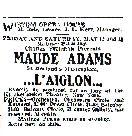 The Post Standard, May 9, 1901 ad |
 The Fort Wayne Sentinel, Aug. 20, 1900 |
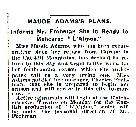 The New York Times, Sept. 14, 1900 |
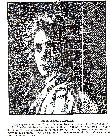 The Post Standard, Nov. 4, 1900 |
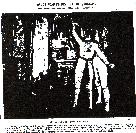 Lincoln Evening News, Nov. 15, 1900 |
 Oakland Tribune, Dec. 8, 1900 |
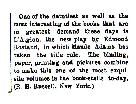 Bedford Gazette, Feb. 8, 1901 |
 The Post Standard, May 8, 1901 |
 The Post Standard, May 11, 1901 |
 Oakland Tribune, July 15, 1907 |
Top row, middle article, refers to an illness of hers. The next article over is sort of not overly friendly towards Maude Adams. The last article on the top row refers to her as a "great star", though.
Second row, second article, refers to the L'Aiglon book, although I'm sure it's an earlier copy than the one that I have a picture of above. The final article refers to a performance of the play some six years later.
The book of the play and other things can be found here.
|


